How do you rescue a seaside town?
- Published
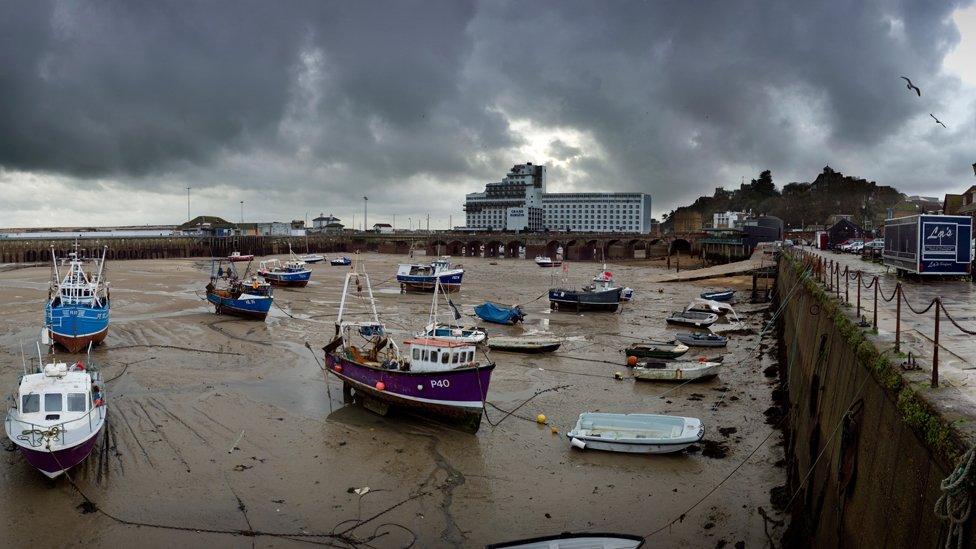
Having been a model of gentility, Folkestone went into a slump. But its efforts to combat its problems and rebuild might be a model for others, writes Hannah Sander.
The seaside town of Folkestone was once the height of fashion.
International superstars Agatha Christie and Yehudi Menuhin were regular visitors. King Edward VII spent so much of his time in the Kent town that locals took to peering in the windows of the Grand Hotel, in order to spot him having illicit tea with his Folkestone mistress Alice Keppel (the great-grandmother of Camilla, Duchess of Cornwall).
Today, a strip of grand mansions along Folkestone's seafront is boarded up. Stretches of sunny beach have become an overnight stop for parked lorries. A closed nightclub completes the scene.
Welcome to the British seaside. All along the coast, seaside towns are in trouble. In the south, authorities battle against the spread of London drug gangs, the tensions fuelled by a European migrant crisis, and a seaside school system which Sir Michael Wilshaw, the head of Ofsted, has warned is failing children.
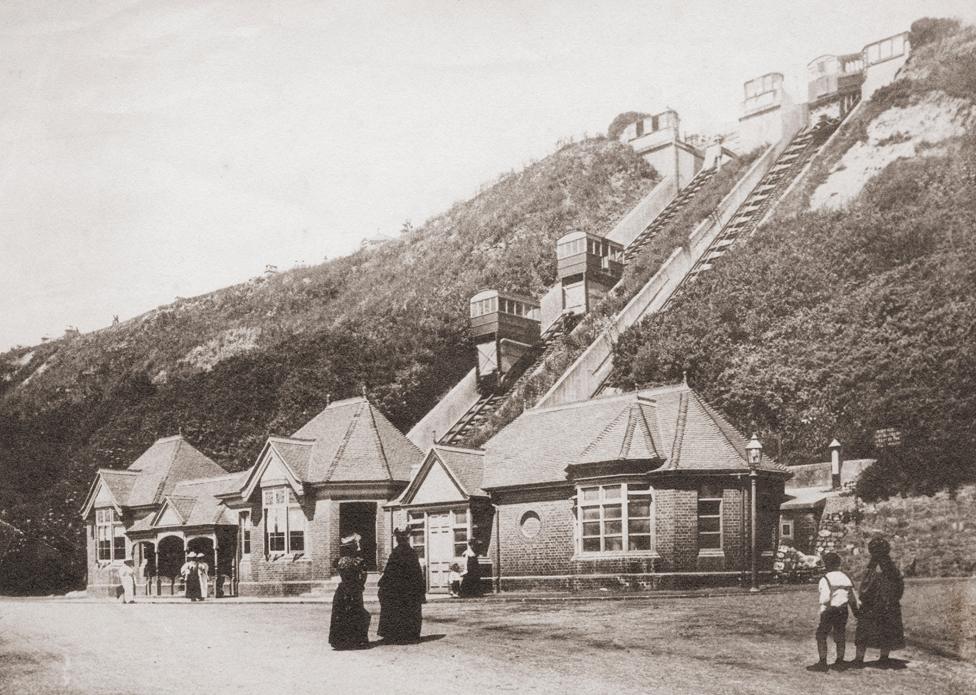
Folkestone's funicular railway in its Victorian prime
And yet only a few minutes' walk along Folkestone beach, pop-up restaurants offer grilled sea bass, oysters and champagne to the tourists. In the past decade the town's new art scene has attracted an affluent following.
Similar transformations are occurring in Margate and Weston-Super-Mare. So are fading seaside towns becoming trendy again?
The British seaside has not recovered from the collapse of the maritime and tourism industries. Populations in coastal towns tend to be older and less ethnically diverse. Coastal towns have higher rates of unemployment and more long-term health problems.
Richard Prothero, from the Office for National Statistics, has analysed 274 seaside destinations around England and Wales. "Not every coastal town is struggling," he explains. "Some are doing very well and remain popular." Nevertheless, his study revealed high levels of deprivation in many seaside resorts.
In Folkestone, ONS statistics reveal that education is a particular concern. "The biggest impact on school performance is parental engagement," says Dr Tanya Ovenden-Hope, visiting fellow at the University of Plymouth. She has been monitoring six struggling academies around England.
"In coastal areas we are finding that parents have perhaps received poor education themselves, or education that didn't lead to a good job. So school is not a priority for them. That makes it much harder to engage the children."

Folkestone
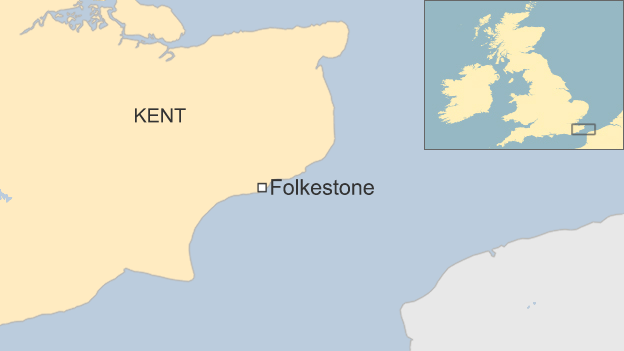
Population: 46,698 (2011 census)
UK constituency: Folkestone and Hythe; MP - Damian Collins (Conservative)
Twinned with Boulogne-sur-Mer and Etaples-sur-Mer in France, and Middelburg in the Netherlands

Ovenden-Hope herself went to school in Folkestone. She worries about the impact of the town's two grammar schools.
On the pavement of Folkestone's shopping district, three local schoolgirls wave colourful signs. They have just completed a sponsored silence, and are now handing out free hot meals to Folkestone's homeless population. "Schools in Folkestone have got a lot better," says sixth-former Shrishma Adhikari. "But there seem to be a lot more homeless people now." All three pupils believe unemployment is a growing problem.
In reality, coastal schools have the opposite problem - too many jobs, not enough staff. "Recruitment is a key issue," Ovenden-Hope explains. "If you are a newly qualified teacher in your 20s, would you want to go to a very remote coastal school that will present you with huge challenges but with a limited social life? Equally, if you are a middle-aged teacher and a job comes up in a coastal school, you might discover there is no employment in the area for your spouse."
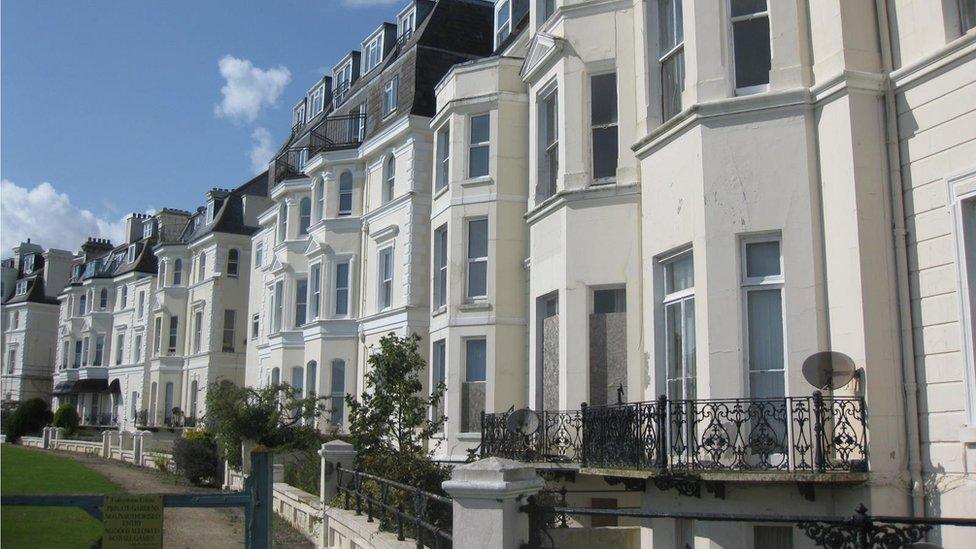
The three pupils volunteering in Folkestone's streets agree that the town can feel far-flung, despite High-Speed 1 trains racing through the fields. "We don't really go to London," Shrishma shrugs. "It's too far away."
Stuart Hooper, the director of intelligence for Kent and Essex Serious Crime Directorate, fears that London is actually far too near.
"It is a new phenomenon - the County Lines," he explains. "Kent and Essex have very good transport to London and so the London drug gangs have the opportunity to widen their market."
Folkestone and Dover are among the southern towns being targeted by up to 180 drug gangs. Criminals in the capital, realising that the Metropolitan Police recognise their faces, have begun to recruit young people as drug mules travelling out to the countryside.
"We need to acknowledge that there are vulnerable young people being exploited," Hooper explains. His team is working with the Met, as well as local addiction services, to monitor violence.
And yet coastal crime is not a new phenomenon. "Gangs and turf wars have been around since at least the 1960s with the mods and rockers, and going back before then," Hooper says. In the 1930s, crime beside the sea was so prevalent that Graham Greene based his novel Brighton Rock (1938) on gang wars. Meanwhile the queen of crime, Agatha Christie, took a suite at Folkestone's Grand Hotel to pen her thriller Murder on the Orient Express (1934), and returned to Folkestone regularly.
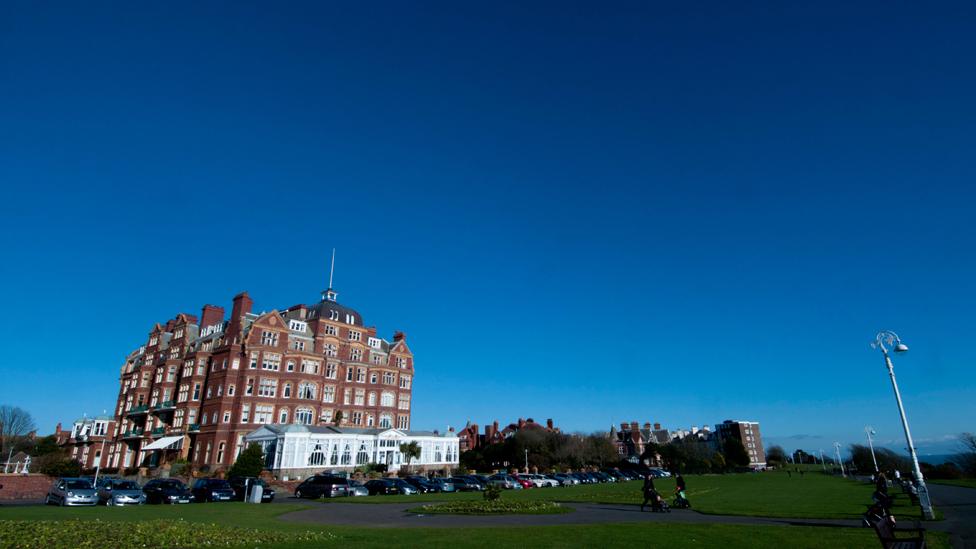
Folkestone's Grand Hotel, where Agatha Christie wrote Murder On The Orient Express
Another type of violence can already be found in the seaside streets. In August, Kent Police was forced to intervene in a clash between the English Defence League and local protest group Folkestone United. The scenes could have taken place a century ago, when an influx of Belgian World War One refugees and British empire soldiers turned Folkestone into one of the most diverse cities in the world. Then as now, a wave of anti-immigration rhetoric followed.
The surge in support for UKIP has been driven by seaside towns such as Grimsby in Lincolnshire and Clacton in Essex. As the starting point for the channel tunnel, Folkestone has been central to the debate around immigration. In 2013 UKIP Leader Nigel Farage declared that he might stand as an MP in Folkestone (he later switched to the seaside region of Thanet).
"The Channel Tunnel drew everything away from here, from town, but it is coming back," explains the waiter in Googies Art Cafe, a trendy burger and craft beer joint in Folkestone's art district. "Folkestone has completely changed. For one thing, it has become a lot more multicultural. It used to be white, white, white. Eventually the town will be as trendy as Brighton."
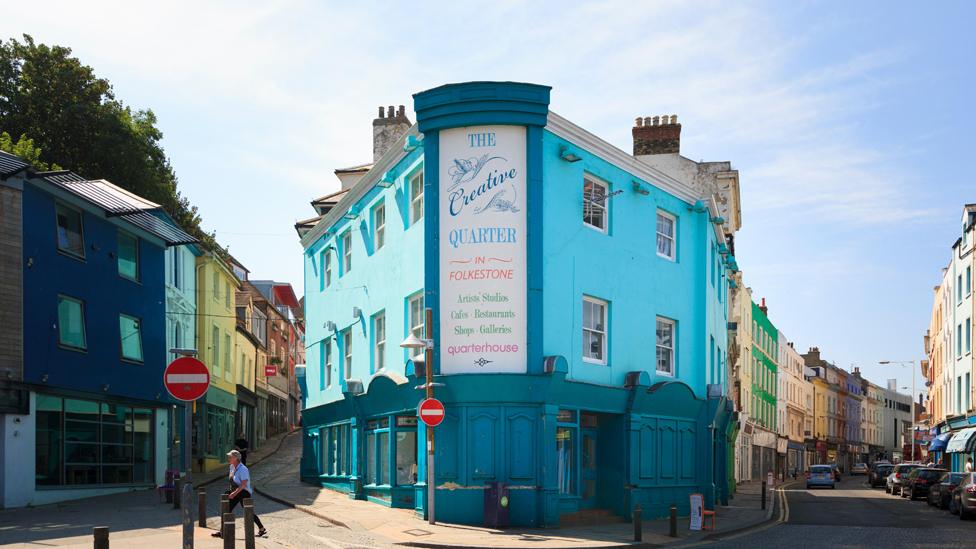
Folkestone's Creative Quarter
Trendiness, it seems, can transform troubled seaside towns into European hotspots. Richard Prothero points to the colossal variation between different seaside towns, sometimes near to each other. Whereas the statistics show Blackpool to be highly deprived, neighbouring Lytham St Annes is thriving. The Lancashire town has a renowned links golf course to draw in tourists.
Elsewhere, Salcombe in Devon has performed better than other seaside towns nearby. The upmarket clothes brand Jack Wills was founded in Salcombe, helping the town earn its nickname of Chelsea-on-Sea.
In Sussex, Hove has borrowed the street cred of neighbouring Brighton, welcoming sister campuses for the university. Thousands of visitors are filling the hotels and restaurants of Bournemouth, this season promoted to the Premier League for the first time.
Margate has capitalised on its connection to Tracey Emin, with the Turner Contemporary art gallery and an installation from artist Grayson Perry. In Weston-Super-Mare, tourism experts expect Banksy's Dismaland to add £7m to the local economy.

Folkestone's own Banksy mural, entitled "Art Buff"
Folkestone has benefitted from some good fortune. The flotation of local business Saga - an insurance and travel company aimed at the over 50s - prompted owner Roger De Haan to pour huge sums of money into regeneration. The result was the Creative Foundation.
"In 2002, the area around the seafront was the most run-down part of town," says Alastair Upton, chief executive of the Creative Foundation. "Roger De Haan bought buildings in the whole area and restored them. Many of the buildings had taken a battering from the environment. The river runs below us and basements still flood periodically. But 90 of these buildings are now available for artistic activity."
The Creative Foundation has launched a triennial art show, a new music and performance venue, a book fair, a public art collection featuring works by Tracey Emin, Mark Wallinger and Richard Wentworth, and has created 300 jobs. More importantly, it has given the town a reputation as an arts hub.
Beth Gibbs manages the Lilford Gallery Folkestone, which opened over the summer, and is found on a winding cobbled street newly crowded with art shops and cafes. Until recently the street had been dilapidated. "We are based in Canterbury," Gibbs explains, "and were looking to expand when I heard about the Old High Street. There is a buzz about this area in the art world."
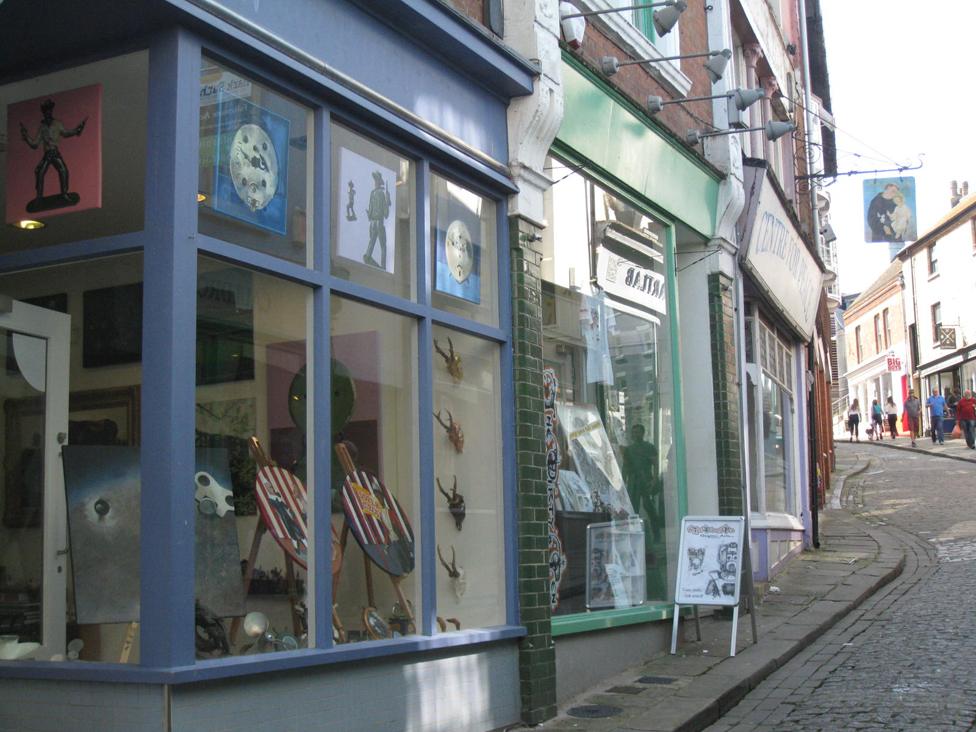
The Old High Street, Folkestone
"Our main market is people coming down from London," Gibbs says, "and a growing number coming over from France. Without the Old High Street, Folkestone would be just a bog-standard English seaside town."
The impact of an arts revival is hard to assess.
In the 12 years since the regeneration began there has been very little research linking the town's economic state or the number of tourists with the new arts scene. The town's economic health has mirrored the country at large. Vast sums have been spent on the regeneration and yet the ONS still rates Folkestone as "deprived". But Upton insists that Folkestone's new arts scene has had a broader impact than that.
"You would be measuring the wrong thing if you measured visitor numbers. Success is a funny thing. There are some measurables - how does the town feel? What are the employment possibilities like? Are jobs secure and well paid?
"But there are also questions of the identity of a town. I think we have done a huge amount on this - changing the way people perceive Folkestone. There is a growing sense of self-confidence and pride for the town."
At Googies, the staff has noticed the impact of Folkestone's new reputation. "We are part of the Folkestone creative scene too - we all promote each other. In the past 10 years Folkestone has completely changed. People will soon start to realise that. We have sun, sand and sea. We have a better life."
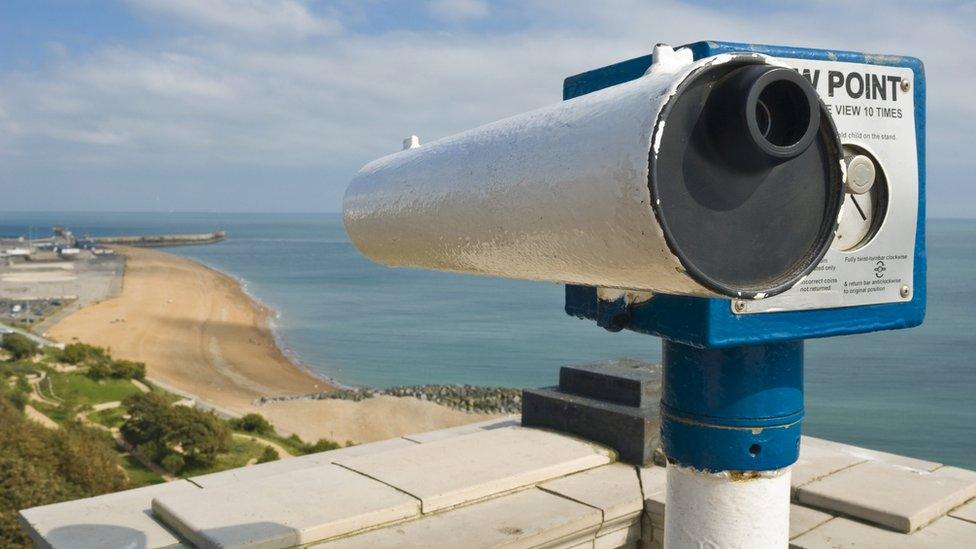
Subscribe to the BBC News Magazine's email newsletter to get articles sent to your inbox.